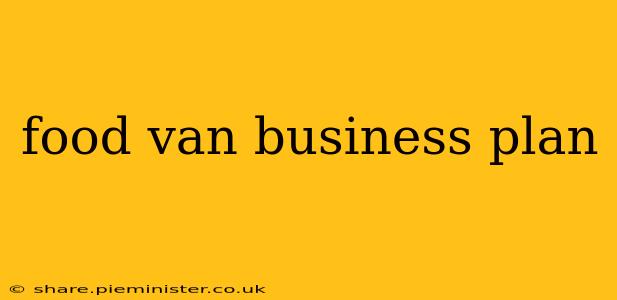Starting a food van business can be an incredibly rewarding venture, offering flexibility, creativity, and the potential for significant profit. However, success hinges on a well-structured business plan. This comprehensive guide will walk you through the essential elements of creating a winning food van business plan, addressing common questions and providing actionable advice.
What are the Startup Costs for a Food Van Business?
Startup costs for a food van business are highly variable and depend on several factors: the type of food you'll serve, the van's purchase price (new or used), necessary equipment, licensing and permits, and initial marketing expenses. Expect to invest significantly more in a new, fully equipped van than in a used one needing refurbishment. A realistic budget should encompass:
- Van Purchase and Modifications: This is often the largest expense. Consider the van's size, fuel efficiency, and suitability for food preparation. Modifications may include installing cooking equipment, refrigeration, and storage.
- Equipment: Commercial-grade ovens, grills, refrigerators, freezers, point-of-sale systems, and other kitchen tools are vital. Choose durable, reliable equipment that meets health and safety regulations.
- Licensing and Permits: These vary by location but are essential for operating legally. Research your local and state requirements for food vendor permits, business licenses, and health inspections.
- Insurance: Protect your business with comprehensive insurance coverage, including liability and property insurance.
- Initial Inventory: Stock up on ingredients, packaging, and supplies to get started.
- Marketing and Advertising: Allocate funds for initial marketing efforts, such as designing a logo, creating menus, and advertising your launch.
What Permits and Licenses Do I Need to Run a Food Van?
Navigating the regulatory landscape is crucial. The specific permits and licenses required vary greatly by location (city, county, and state). However, common requirements include:
- Business License: This is a general license needed to operate a business in your area.
- Food Vendor Permit: This allows you to sell food to the public.
- Health Permit: This ensures your food handling practices meet safety standards. Regular health inspections will be necessary.
- Seller's Permit (or equivalent): This is for collecting sales tax.
- Vehicle Registration and Insurance: Ensure your food van is properly registered and insured.
It's crucial to contact your local authorities (health department, city hall, etc.) to obtain a complete list of required permits and licenses for your specific location. Don't start operating until you are fully compliant.
What is the Best Type of Food to Sell from a Food Van?
The best type of food to sell depends on several factors, including your culinary skills, target market, and competition. Consider these points:
- Target Market: Who are you trying to reach? Students, office workers, tourists, or families will have different preferences.
- Competition: What kind of food is already available in your area? Differentiate yourself by offering something unique or superior.
- Ease of Preparation: Choose recipes that can be prepared efficiently in a mobile setting.
- Profit Margins: Analyze the cost of ingredients versus the potential selling price to ensure profitability.
- Demand: Research the local demand for different types of food.
Popular food van options include gourmet burgers, tacos, wood-fired pizza, specialized sandwiches, and ethnic cuisine. However, success is more about execution and customer service than the specific food itself.
How Much Profit Can I Make from a Food Van Business?
Profitability depends heavily on factors like menu pricing, sales volume, operating costs, and efficient management. While there's no guaranteed profit, a well-managed food van can be quite lucrative. Thorough financial planning, including detailed cost analysis and realistic sales projections, is crucial.
How Do I Find the Best Location for My Food Van?
Location is paramount to a food van's success. Consider these factors:
- High Foot Traffic: Areas with significant pedestrian or vehicle traffic, such as busy streets, parks, events, or near offices and schools, are ideal.
- Accessibility: Ensure easy access for your van and customers.
- Competition: Analyze the existing food vendors in the area and identify opportunities for differentiation.
- Permits and Regulations: Check local regulations regarding food vending in different locations. Some areas may have restricted zones or require permits for specific locations.
- Parking and Utilities: Consider access to electricity, water, and waste disposal.
What Marketing Strategies Should I Use for My Food Van?
Effective marketing is essential to attract customers. Consider these strategies:
- Social Media Marketing: Use platforms like Instagram and Facebook to showcase your food, announce locations, and engage with customers.
- Local Partnerships: Collaborate with local businesses, events, or organizations to increase visibility.
- Loyalty Programs: Reward repeat customers with discounts or special offers.
- Online Ordering and Delivery: Consider offering online ordering and delivery services through apps or your own website.
- Signage and Branding: Develop eye-catching signage and a consistent brand identity for your van.
This comprehensive business plan outline provides a solid foundation. Remember to adapt it to your specific circumstances and always conduct thorough research to ensure your food van business thrives. Consult with business advisors and mentors for additional support and guidance.
